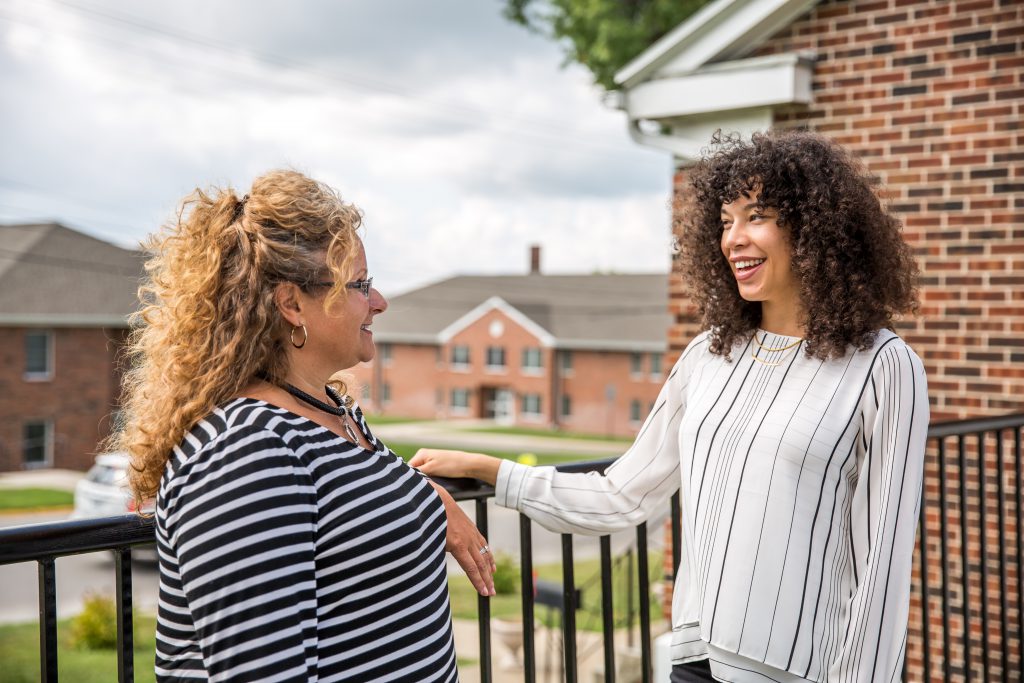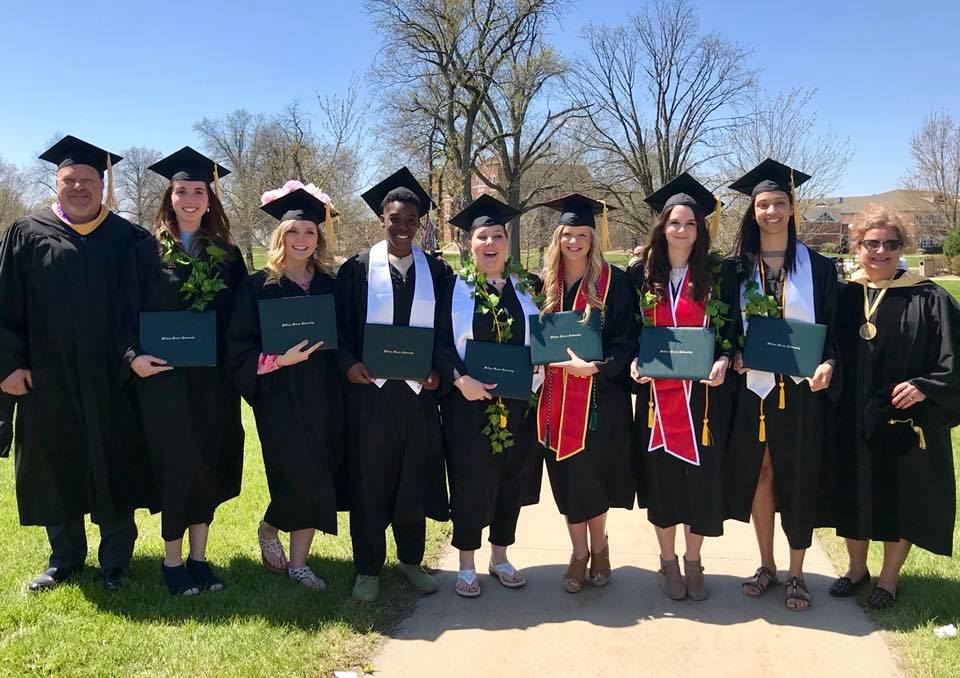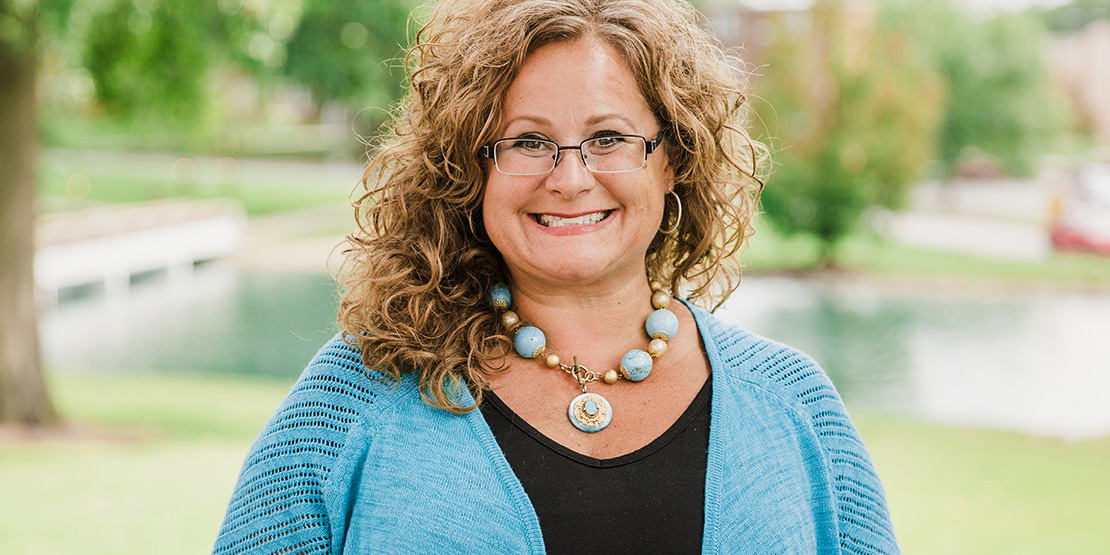Finding her best career fit
I did not know what Social Work was until after I graduated with my bachelor’s degree. I was working several different jobs in service organizations and I listened to people’s advice on what degree to pursue and applied to the master’s program in Social Work at Mizzou. That really opened a lot of doors for me as far as career opportunities. I worked at Rainbow House Child Abuse Shelter and the Juvenile Justice Center, which was a detention facility for kids while I was in graduate school. I worked at a private psychiatric hospital in the children’s and adolescent unit. But the longest portion of my Social Work practice career was at the Boone County Prosecutors Office, where I worked as a victim advocate for almost seven years and helped create the Boone County Victim Response Team.
From the field to teaching
I had never thought of teaching as a career. I was a social worker working in the prosecutor’s office with victims of violent crime, and I was getting my supervision for my clinical license. During that process, I met with a past professor of mine every week for two years for the licensing process. She kept encouraging me to think about teaching. At the time, I never thought of myself as a teacher because I enjoyed my work, however, she saw something in me before I saw it in myself and I am grateful for her encouragement. I taught my first class called Senior Seminar as an adjunct professor at Mizzou where I worked with senior Social Work students who were doing internships. I also helped them bridge the gap between classroom learning and experiential learning. I really enjoyed it! My mentor kept encouraging me to think about teaching full time and they had an opportunity to hire for a teaching position. I applied and took a leap of faith, left my full-time job and started teaching Social Work at Mizzou in 2001.

Coming to William Woods
When I was hired at Mizzou, I had a master’s degree and was hired under a child welfare grant for the purpose of teaching Social Work students interviewing skills and introducing them to career opportunities in child welfare. I realized quickly that I liked teaching, and to stay in academia, you need a Ph.D. I decided to pursue my Ph.D. while I worked at Mizzou and I finished my course work in 2007. At that time, a Social Work position at William Woods University became open. I had been involved with the WWU Social Work program long before that because I served on the program’s Professional Advisory Board when I was working in the prosecutor’s office. I had also supervised William Woods students who were doing their internships in victim advocacy and had worked with both George Garner and Professor Harriet Yelon for many years. Because I was familiar with this program and I had completed my coursework, I decided that the timing was right and I applied for the Social Work program director position. It has been a great fit ever since!
Making Social Work interesting
A lot of people don’t know what Social Work is, don’t realize the breadth of this profession and the fact that you can work in so many different areas with so many different kinds of people. One of the fun things about teaching Social Work is introducing people to what professional Social Work is and the wide employment opportunities that a student would have after graduation. We like to do service learning projects and get students out into the community as soon as possible in a variety of settings. All of our students will have been involved in numerous service learning projects before they graduate. We also bring in a lot of guest speakers to classes or LEAD events, where they share their career experiences and their stories. I think students learn a lot through hearing people’s stories and experience, helping them learn different perspectives. I think students become excited when they realize that there are many opportunities in this profession; for example, a lot of students come to school wanting to be a counselor and they don’t realize that Social Work is one of the best ways to get there.
Advantages of having a Social Work degree at WWU
One of the things that stands out about our program is our senior field practicum, which is accredited by the Council for Social Work Education. Every accredited Social Work program must have a field practicum for their degree. The difference with us is that our students are in an internship over their entire senior year, so it is two semesters versus one. Our students complete 500 hours of a supervised internship in an agency from August through April. During their senior year, our students are in that agency three days a week and are in our Social Work senior-level courses on Tuesday and Thursdays. The national standard for field practicums is 400 hours, but our Social Work program has set the program standard at 500 hours. We continue this tradition because we value more clinical hours. When our students apply for graduate school or for a job, they have 100 more hours than what is required by our national standards, which helps to set our students apart. All of our graduates have been able to find jobs and or go on to graduate school and are getting in, and we have had great success with our students being accepted into graduate school. About 60% of our students will go into the work force right away and have not had trouble finding jobs. The rest are going straight into graduate school. One of the advantages to a Bachelor of Social Work degree is that you can earn a master’s degree in Social Work in a shorter amount of time. Students who graduate from an accredited program can apply for what is called advanced standing which allows you to earn that master’s degree in one-year. If you have a degree in something else, it will take two years to earn a master’s degree in Social Work. It is definitely an advantage to get a bachelor’s degree in Social Work if you know you want to go on to earn a master’s degree in it.
Offering a wide array of options for a career
Social Work might be the right fit for a person who is interested in a profession where they are helping a wide variety of people every day to solve problems and improve their lives. Social workers work in a variety of settings like schools, hospitals, nursing homes, veterans’ centers, and mental health hospitals. If someone wants to work with mental illness, addiction, child abuse and neglect, family violence, or with children, teens, families and elderly, this might be a great profession for them. With a bachelor’s degree, they can do a lot of direct services work with individuals and families in many different agencies. With a master’s degree, you can do therapy, work in hospital settings and do clinical work. It is a very broad and well-respected degree in the social services field. With both a master’s and bachelor’s degree, you can get licensed in the state of Missouri.
Having fun outside of social work
In my free time I like taking photographs, watching sports, and being outside. I like softball, basketball, and football. It is a lot of fun to watch William Woods athletics because I have a lot of student athletes in my classes, who spend a great deal of time playing their sport and it allows me to get to know them outside of the classroom. I have a new respect for student athletes and the incredible amount of time and energy they put into their sport and how they balance their time with academics and athletics.

The best part of the job
My favorite part is developing mentoring relationships with students and watching them grow from their freshman year to the day of graduation and then watching their careers take off and grow. I stay in contact with all of our alumni and I love it when they share success stories like landing a new job, getting into graduate school or when they move into different phases of life and become parents, or their families grow. I find so much joy and satisfaction knowing that I helped mentor them and hopefully I made a difference in their lives. I often think about my early mentors and I hope that I have, in my role as a professor, served as that person for someone else. One of my dreams is that one day one of my students will go on to become a Social Work professor and pay it forward.

